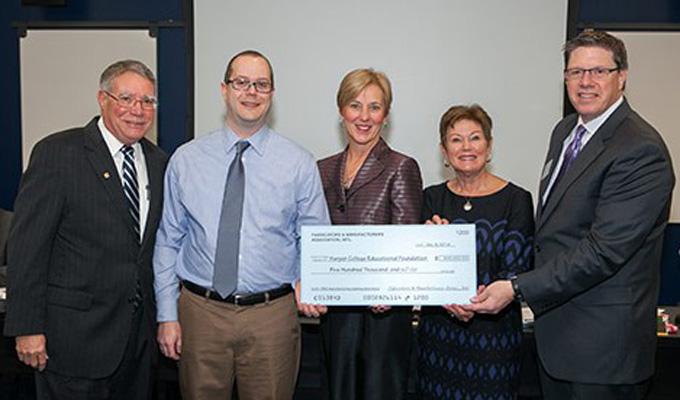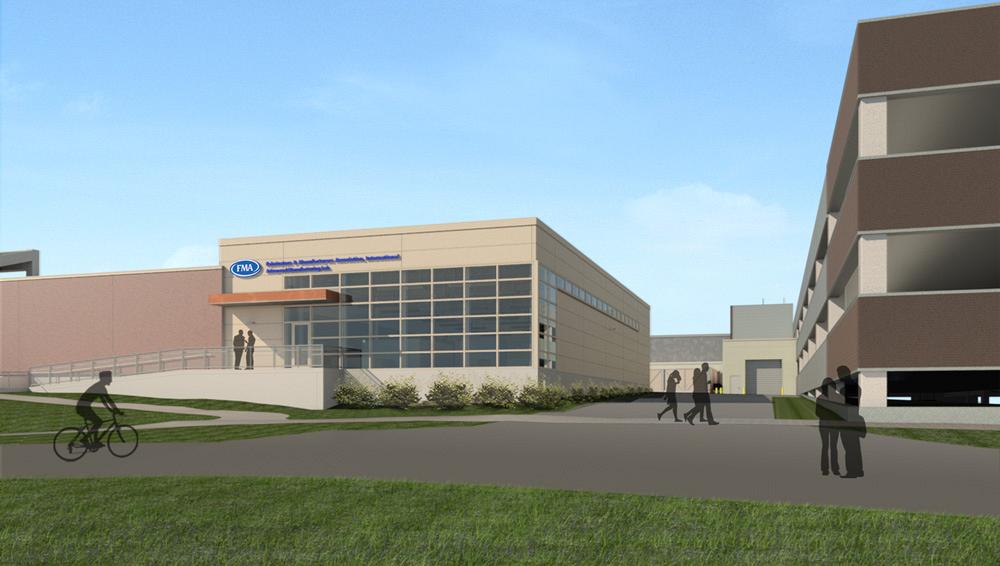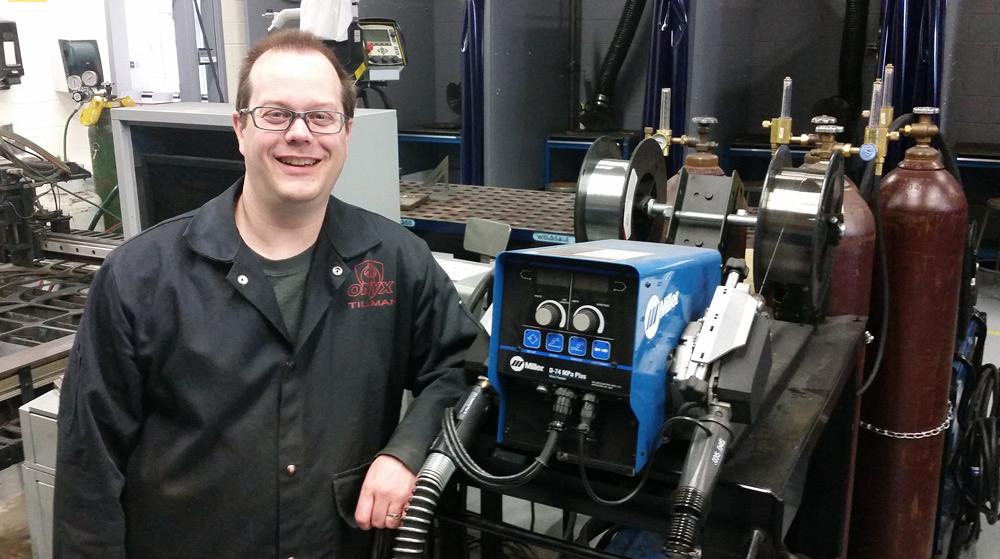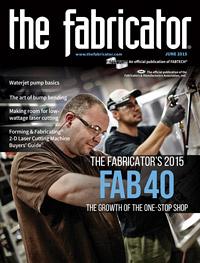- FMA
- The Fabricator
- FABTECH
- Canadian Metalworking
Categories
- Additive Manufacturing
- Aluminum Welding
- Arc Welding
- Assembly and Joining
- Automation and Robotics
- Bending and Forming
- Consumables
- Cutting and Weld Prep
- Electric Vehicles
- En Español
- Finishing
- Hydroforming
- Laser Cutting
- Laser Welding
- Machining
- Manufacturing Software
- Materials Handling
- Metals/Materials
- Oxyfuel Cutting
- Plasma Cutting
- Power Tools
- Punching and Other Holemaking
- Roll Forming
- Safety
- Sawing
- Shearing
- Shop Management
- Testing and Measuring
- Tube and Pipe Fabrication
- Tube and Pipe Production
- Waterjet Cutting
Industry Directory
Webcasts
Podcasts
FAB 40
Advertise
Subscribe
Account Login
Search
FMA $500,000 grant supports Harper College manufacturing education
Boosting industry at Harper College
- By Sue Roberts
- May 26, 2015
- Article
- Shop Management

Presentation of the $500,000 FMA grant took place at the December 2014 Harper College Educational Foundation board meeting. Pictured left to right: Dr. Ken Ender, president, Harper College; Kurt Billsten, coordinator, Harper College Advanced Manufacturing Technology program; Mary Beth Ottinger, dean of Career and Technical Programs, Harper College; Kathy Gilmer, board president, Harper College Educational Foundation; and Ed Youdell, president and CEO, FMA. Photo courtesy of Harper College.
"In five years I expect us to be filling the FMA Advanced Manufacturing Lab with 600 students a year who will learn skills that the industry needs to work with current equipment," said Kurt Billsten, coordinator and instructor of the Advanced Manufacturing Technology program at Harper College, Palatine, Ill.
His expectations are well on their way to realization because of innovative programming, industry involvement, the college's renewed dedication to manufacturing programs, and a $500,000 grant from the Fabricators & Manufacturers Association Intl. (FMA).
Training for the Future
FMA's support of Harper College's manufacturing education program began with a challenge to the association from Carlos Borjas, president of Feralloy Corp., Portage, Ind. At the same time, Borjas was serving as FMA chairman of the board.
"Carlos challenged us to develop a new way for the association to create a workforce solution for our industry," said Ed Youdell, FMA president. "We investigated the idea of founding a stand-alone FMA University but the cost was prohibitive. Through discussion with Kurt and Harper College in 2013, we found that partnering with an established program could be cost-efficient and give us a speed-to-market advantage."
About that same time Billsten talked with Jim Warren, FMA's senior director of member services, education, and fundraising, while they perused equipment at FABTECH® 2013 in Chicago. "Jim and I thought, "What if we could form a partnership?' It was a long shot because FMA had never done anything like that before. Many conversations, e-mails, and meetings later, we reached an agreement."
The agreement resulted in a $500,000 FMA grant with a twist. The funds will be released over five years contingent on program enrollment benchmarks. "It's a unique approach," said Youdell. "They have to grow the program to get the full benefit of the grant, and the timed disbursements will keep us actively engaged."
Part of the grant will be added to the $1.5 million the college is investing to double the size of its current manufacturing lab. The 6,000-sq.-ft. expansion will house state-of-the-art equipment like lasers, turrets, press brakes, and robotic welders. FMA members are providing some of the equipment.
"After FMA announced the grant, a lot of suppliers contacted me and asked what they could do to help. So far Amada, Mitsubishi, and Miller Electric have pledged equipment," Billsten said. "The new equipment will help us attract more talented instructors and boost the enrollment. We are also working on agreements with other community colleges to allow their students to come to Harper for training on equipment their facilities do not have available."
Building Character
A portion of the grant, $100,000, will go to manufacturing students who qualify for the Harper College Promise Scholarship. Criteria for the scholarship were developed by Harper College, area high schools, and regional business leaders based on skills and habits that employers look for in their new hires in addition to technical knowledge.
Billsten explained why the Promise Scholarship is unique. "Our scholarship is more of a character scholarship. Criteria include having a C average, better than 90 percent attendance, and participation in some kind of community service. If requirements are met, Harper will pay for the first semester. If requirements are fulfilled again during that first semester, the student will qualify for funding for the next semester, and so on.

An artist’s rendering shows the 6,000-sq.-ft. addition that will carry the name and logo of the Fabricators & Manufacturers Association International. The Advanced Manufacturing Lab is expected to be completed in time for FABTECH in November 2015. Photo courtesy of Harper College.
"Students who go through the Harper Promise program are the kind of people a company will want to hire as soon as they have their diplomas or certificates. They have been trained on current equipment in a shop like environment and they are reliable."
Gaining Ground
Harper's manufacturing program enrollment had declined during the 1990s to the point where it was eliminated for several years. In 2003 the college turned to Billsten. "I was brought in to start an industrial maintenance program that included welding, and the program took off. When it started we had nine welding students," Billsten said. "Now we have about 150 welding students and about 500 students total throughout the Advanced Manufacturing programs every semester."
Dr. Kenneth Ender, president of Harper College since 2009, lends his full support to expanding the manufacturing program that is being emulated by other colleges. Twenty-one community colleges are following portions of the program as best-practice techniques as part of a multimillion-dollar grant through the Department of Labor.
Under Ender's direction the college became involved in Manufacturing Day, an event co-sponsored by FMA that encourages manufacturers to open their doors to introduce students to the realities of today's manufacturing. Harper also became an FMA Certified Education Center (CEC), one of over 40 colleges that partner with the association to enhance efforts to offer current, engaging metal forming and fabricating education.
Much of FMA's credentials and certificates curriculum is included in Harper's program. Eighteen Harper students were recently awarded the industry-recognized FMA Fundamentals of Metal Fabrication Certificate, scoring between 90 and 98 percent on the precision sheet metal fabrication exam.
Harper's manufacturing program has built a formula for success. Industry is excited about contributing, local shops are reaching out to the college's Job Placement Resource Center that helps place students in jobs, and students are registering, graduating, and working in industry.
Shaping the Future
Billsten attributes the success to several unique aspects of the program:
- Classes are structured like a shop. Students are expected to work independently and complete assignments when they come to class. "If things don't get done on the job, you don't get paid. Here, you don't get credits."
- Students keep practicing a skill until it is mastered. "Some programs limit the amount of hands-on training. Our students have as much material and time as it takes for them to become proficient. For some students it may be two or three attempts, for some it may be two or three weeks."
- Instructors from industry teach their own areas of specialty. "It's impossible for any teacher to be an expert in everything. We bring in instructors who are experts in one area to teach what they know best."
- A new curriculum makes the training relevant today. "When I came to Harper, I started by writing a new welding curriculum. Things have changed, and our training needs to continually reflect the advances."
- Training is done on "real-world" equipment. "I want students to learn on the kind of equipment they will use in a shop. We'll buy smaller models but no tabletop versions because that is like training on a toy. It's not real-world."
- Industry is involved. "We listen to industry. We reach out to see what is needed and adjust what and how we teach to meet those needs."
Meeting the Challenge
The FMA grant is helping Harper College grow the program. In return, FMA gains exposure by having its name on the new Advanced Manufacturing Lab building.
"Harper College is in the heart of the market that FMA serves," said Youdell. "There is a very high concentration of FMA members and stakeholders in the Chicago area, and several major suppliers are located up and down the highways. This partnership is helping raise the FMA profile and visibility to the people we serve and work with."
The partnership also helps FMA meet the challenge to proactively engage with and educate young people to ensure a skilled industrial workforce for the future.
Kurt Billsten, coordinator and instructor of the Advanced Manufacturing Technology programs, Harper College, 1200 W. Algonquin Road, Palatine, IL 60067-7398, 847-925-6149, kbillste@harpercollege.edu, www.harpercollege.edu
.About the Author

subscribe now

The Fabricator is North America's leading magazine for the metal forming and fabricating industry. The magazine delivers the news, technical articles, and case histories that enable fabricators to do their jobs more efficiently. The Fabricator has served the industry since 1970.
start your free subscription- Stay connected from anywhere

Easily access valuable industry resources now with full access to the digital edition of The Fabricator.

Easily access valuable industry resources now with full access to the digital edition of The Welder.

Easily access valuable industry resources now with full access to the digital edition of The Tube and Pipe Journal.
- Podcasting
- Podcast:
- The Fabricator Podcast
- Published:
- 04/16/2024
- Running Time:
- 63:29
In this episode of The Fabricator Podcast, Caleb Chamberlain, co-founder and CEO of OSH Cut, discusses his company’s...
- Trending Articles
How to set a press brake backgauge manually

Capturing, recording equipment inspection data for FMEA

Tips for creating sheet metal tubes with perforations

Are two heads better than one in fiber laser cutting?

Hypertherm Associates implements Rapyuta Robotics AMRs in warehouse

- Industry Events
16th Annual Safety Conference
- April 30 - May 1, 2024
- Elgin,
Pipe and Tube Conference
- May 21 - 22, 2024
- Omaha, NE
World-Class Roll Forming Workshop
- June 5 - 6, 2024
- Louisville, KY
Advanced Laser Application Workshop
- June 25 - 27, 2024
- Novi, MI



























